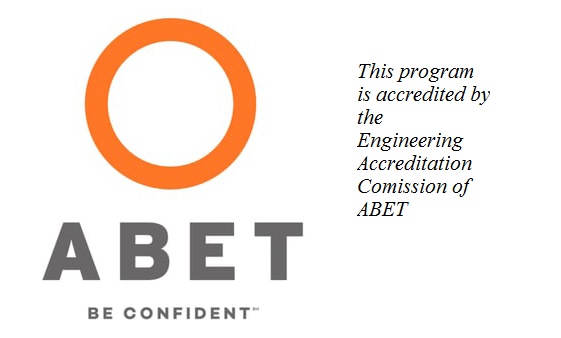Electrical Engineering
To contribute in developing electrical and computer engineering principles and applications, and to prepare qualified and ethically responsible engineers who are capable of life-long learning, adhering to the highest professional standards, able to engage in engineering projects, and participate effectively in serving the community.

- Be productive and responsible professionals in their field capable of communicating effectively with coworkers and clients.
- Engage in lifelong learning, in a field characterized by rapid developments, including through research and graduate work.
- Adhere to the highest ethical standards and demonstrate an involvement in professional activities and public services.
- An ability to apply knowledge of mathematics, science, and engineering principles.
- An ability to design and conduct experiments, to analyze and interpret data.
- An ability to design a system, component, or process to meet desired needs.
- An ability to function on multidisciplinary teams.
- An ability to identify, formulate, and solve engineering problems.
- An understanding of professional and ethical responsibility.
- An ability to communicate effectively.
- The broad education necessary to understand the impact of engineering solutions in a global and societal context.
- A recognition of the need for, and an ability to engage in life-long learning.
- A knowledge of contemporary issues.
- An ability to use the techniques, skills, and modern engineering tools necessary for engineering practice.
Planning, designing, and operating:
- Electrical Power Systems.
- Renewable Energy.
- Generators, Motors and Drives.
- Control Systems.
- Power Electronic Systems.
- PLC and Industrial Plants.
- Electrical Installations.
- Wired and Wireless Communication Systems.
- Communication Networks.
- Microwave, Radar, and Optical Fiber Systems.
- Electronic and Security Systems.
- Digital Signal Processing.
- Computerized Systems.
- Computer Networks.
- Robotics.
- Digital Systems.
- Computer Aided Design.
- Webpage and Database Design and Management.
The plan consists of 158 credits distributed as follows:
|
Requirements |
Credit Hours |
|
University Requirements |
19-20 |
|
Faculty Requirements |
30 |
|
Specialization Requirements |
103 |
|
Free Elective Courses |
6-5 |
|
Total |
158 |
- Compulsory Courses: 90 credits as follows
|
Course No. |
Course Title |
Prerequisite(s) |
|
Calculus And Analytical Geometry 3 |
||
|
Introduction to Linear Algebra |
||
|
Numerical Methods |
||
|
Ordinary Differential Equations |
||
|
Dynamics |
||
|
Thermodynamics |
||
|
Digital Electronics And Computer Organization Lab |
ENCS2304 or concurrent |
|
|
Digital Systems |
||
|
Computer Structure and Organization |
||
|
ENCS4308 |
Microprocessor and Embedded Systems |
|
|
ENCS5101 |
Microprocessor and Embedded Systems Lab |
ENCS4308 |
|
BUSA2302 |
Engineering Project Management |
No Prerequisites |
|
Circuits Lab |
||
|
Network Analysis 1 |
||
|
Signals And Systems |
||
|
Electronics 1 |
||
|
Network Analysis 2 |
||
|
Probability And Engineering Statistics |
||
|
Electrical Machines |
||
|
Electrical Machines Lab |
||
|
Electronics Lab |
||
|
Principles Of Communication Systems |
||
|
Electronics 2 |
||
|
Power Electronics |
||
|
ENEE3307 |
Electromechanical Principles and Applications |
|
|
Communication Systems |
||
|
ENEE3318 |
Electromagnetics |
|
|
Engineering Simulation Lab |
||
|
Control And Power Electronics Lab |
||
|
Communication Lab |
ENEE3309 |
|
|
Electrical Installation And Drawing |
||
|
Training |
Fourth year student and Department permission |
|
|
Control Systems 1 |
||
|
Devices And Measurements |
||
|
Power Systems |
||
|
Introduction to Graduation Project |
||
|
Graduation Project |
- Optional courses:
13 credit hours as chosen from the following:
- Specialization students: have to finish all of the courses at one group (10 credit hours)
plus 3 optional credit hours from the following.
- General Path (No Specialization): have to finish 16 credit hours including a lab
(5 courses + lab) from the following:
|
Group |
Course No. |
Course Title |
Prerequisite(s) |
|
Group one: Specialization of Communication |
Advanced Lab In Communication |
ENEE4103, ENEE3401 |
|
|
Applied Electromagnetics |
ENEE3318 |
||
|
Information And Coding Theory |
ENEE3309 or ENEE339 |
||
|
Wireless Communication |
|||
|
Group two: Specialization of Computer |
Operating Systems |
||
|
Computer Networks Lab |
|||
|
Computer Networks |
|||
|
Computer Architecture |
|||
|
Group three: Specialization of Control and Power |
Power Electronics Lab |
||
|
Electrical Machines And Special Electrical Machines Management |
|||
|
Protection And Automation In Electrical Power Systems |
|||
|
Renewable Energy And Photovoltaic Power Systems |
|||
|
Group four: More optional Courses |
Special Topic In Communication Engineering |
Fourth year and department approval |
|
|
Special Topic In Computer Engineering |
Fourth year and department approval |
||
|
Special Topic In Power Engineering |
Fourth year and department approval |
||
|
Control Systems 2 |
|||
|
Real Time And Embedded Systems |
|||
|
Special Topic In Computer Engineering |
Fourth year and Department approval |
- Student must successfully complete and obtain a cumulative average of 70% or more in the following courses: MATH1411, MATH1321, PHYS141, PHYS132, ENME121
- Department approval based on its capacity. In the case the number of applicants exceeds the enrolment capacity of the Department, only those with the highest overall competitive average grade will be admitted. The average grade will be calculated based on the grades of all course attempts.

